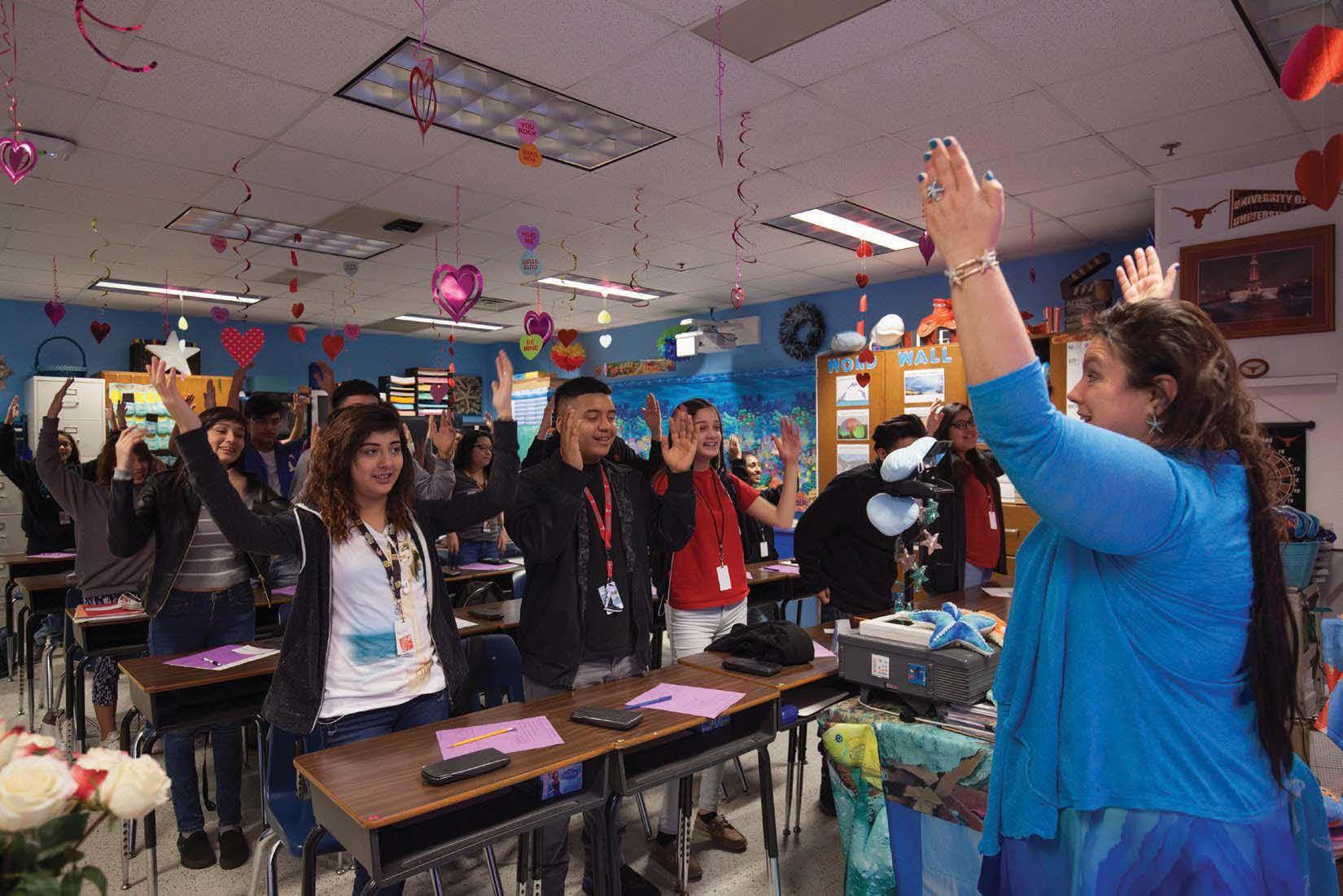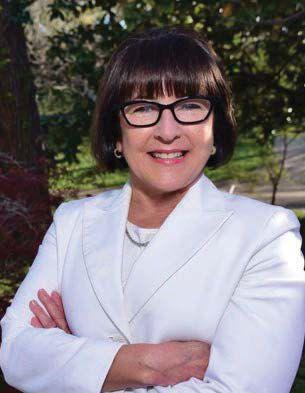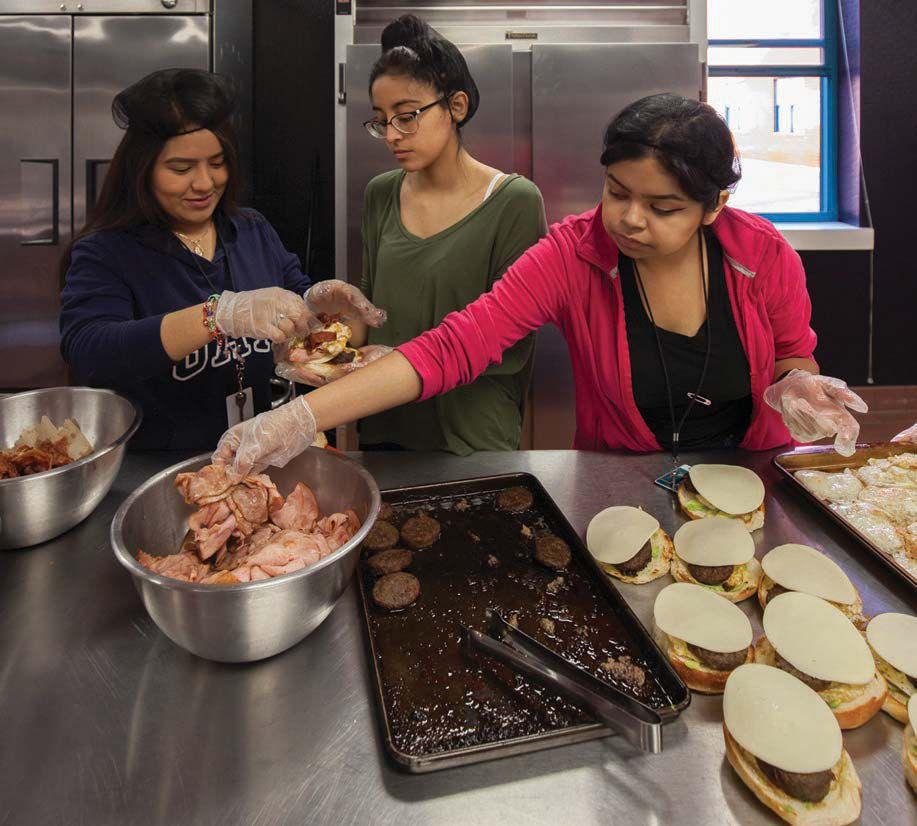
4 minute read
THE X FACTOR
The biggest and best high school you don’t know
By RACHEL STONE
Molina High School, which turns 20 this year, is among the best non-magnet high schools in Dallas ISD — and the numbers prove it.
It was one of seven high schools district-wide that received the highest number of distinctions possible from the State of Texas last year. And its students have the highest algebra scores of any comprehensive high school in the district.
That level of excellence comes from a school where about 92 percent of approximately 2,100 students are economically disadvantaged, according to federal standards. About 27 percent have limited English proficiency.
It’s hard to pinpoint exactly how the school became so successful. Principal
Terry-Ann Rodriguez credits the teachers as well as the school community for creating a space where students expect themselves to achieve.
Most teachers offer free after-school tutoring. And the high algebra scores can be attributed to math teachers who offer extra instruction every Saturday, she says.
“They care. They work extra hard. They are working all the time,” she says.
Next year the school will offer 150 ninth-graders the chance to enter a collegiate academy for business and technology. That track makes available up to 60 hours of tuition-free college credit through Mountain View College earned simultaneously while students are achieving their high school diplomas.
Aside from straight academics, Molina also has strong visual and performing arts education, plus a culinary arts program.
Salomon Elias, formerly the assistant band director at Sunset High School, recently took over as director of the Molina band.
Assistant director Chris Cavanaugh taught band at three Molina feeder schools: Mary McLeod Bethune, Nancy J. Chochran and Leila P. Cowart elementary schools. When he arrived at Molina, he captured as many of his former elementary band students as possible. This year the band has about 95 members, up from 35 when he started five years ago, and Cavanaugh is still striving for his goal of 100 musicians.
“A lot of the kids have achieved great strides,” Cavanaugh says. “They’ve achieved more than they thought they could.”
Along with marching band, there’s also a garage band class and a mariachi band, which went to the state competition in February. Molina offers graphic and fine arts, theater, choir, show choir and two dance troupes.
Choir instructor Jackie Turner-Creel says she’s proudest of her students for their work ethic. They often compete against wealthier schools, where parents can afford private lessons. Some
Molina parents work more than one job and rarely have the chance to see their talented children perform. But the kids keep their chins up, she says.
“They keep a positive attitude, and they’re very humble,” Turner-Creel says. “They surprise me with the character they show. They don’t get down, they get stronger.”
Molina’s culinary arts program started two years ago, part of a hospitality concentration that also includes courses in restaurant, M.J.’s Café.
Next year, they plan to add a baking class.
“The idea is that, whatever they want to do in life, they always have this skill to fall back on,” Denman says.

The ultimate goal is for every Molina student to graduate and pursue some sort of post-secondary education, Rodriguez says. Currently the graduation rate is 90.28 percent, compared to the districtwide rate of about 88 percent.
Molina’s 180 staff members try to make the school an inviting, safe place, a home away from home, she says. And because of that there are “minimal discipline issues.” restaurant management and entrepreneurship. Upper-level students can take a three-hour practicum in the kitchen. The lead instructor is chef Michael Denman, who has a culinary degree as well as a bachelor’s degree in history.
Every student in the program is expected to earn two food-handler certifications from the State of Texas. And they gain real experience catering events and serving lunch twice a week in the school’s

Transparency and communication are factors in the equation of what makes Molina academically successful. Teachers and administrators hold meetings three times a week to analyze classroom data, which drives instruction. Rodriguez holds “coffee with the principal” meetings monthly in the school’s library, inviting parents as well as community members to ask questions and hear updates.
It takes everyone being involved.
“We have dedicated teachers, veterans and newbies, but they’ve all bought into the vision,” Rodriguez says. “We’re in this together. We built it together.”
Parks

Those of us perturbed by seeing people litter or fail to clean up after their dogs in public parks might see some relief this year. The City of Dallas has reinstated its Park Rangers program, assigning six staff members to patrol its parks for added safety and to better enforce city laws. The rangers would be certified in CPR and other life-saving skills in case they need to assist the public in a medical emergency, but largely they would be charged with enforcing the often-unenforced rules of the city, like public alcohol consumption, ensuring special events in the parks follow city code and the newly passed ban on smoking, which goes into effect March 1. Most major cities in Texas have park rangers on staff — Austin has 24, while Houston has 37. The Park and Recreation Department hope to find the funds needed to eventually add 10 bicycle patrol rangers as well as a citizen park patrol.

Healthcare
An Oak Cliff-based healthcare nonprofit has a new name. AIDS Arms Inc. is now Prism Health North Texas. The organiza- tion opened in 1986 to provide healthcare and other services amid the AIDS epidemic crisis. The new name reflects the broader spectrum of services it now provides. “HIV treatment has improved over the last 30 years to such a degree that today the focus is less on AIDS and more on the prevention and treatment of HIV,” says Prism Health North Texas CEO Dr. John T. Carlo. Prism changed the names of its two health clinics to Trinity – Oak Cliff clinic and Peabody –South Dallas clinic. The organization’s mission won’t change with the name.
Education
M.J.’s Cafe , the Molina High School restaurant, serves lunch from 11 a.m.-1 p.m. twice a week, and it’s open to the public. Students of the school’s culinary program serve tacos every Tuesday, and on Wednesdays, there’s a plate lunch. All of the lunches cost around $5, and it’s cash only. To gain entry to the restaurant, you’ll have to show a state-issued ID and receive a guest pass at the front desk. Lunches can be eaten in the restaurant (which is inside a classroom) or be taken to go.











